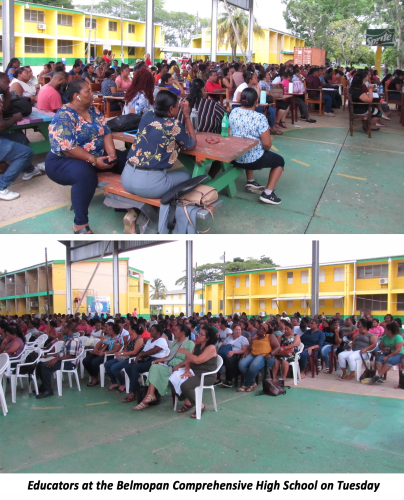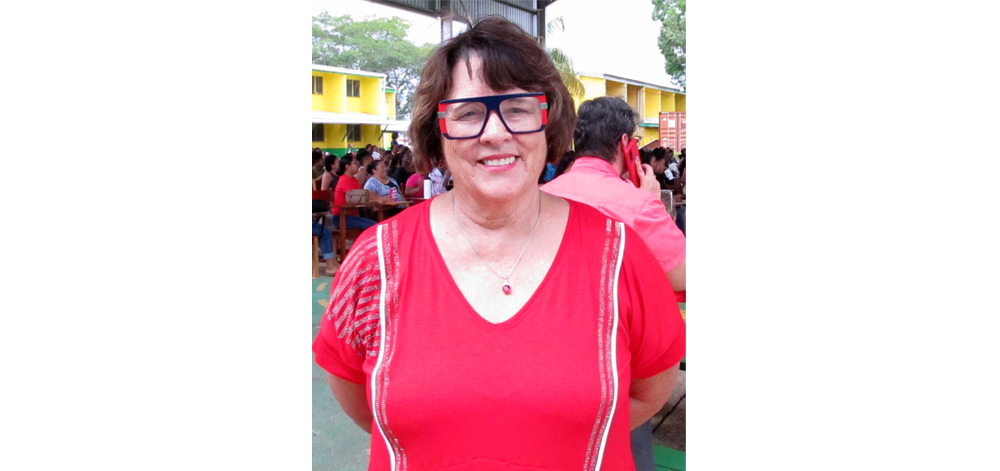Photo: Dr. Lynne Paradis is the project leader of Literacy Alive
by Orlando Pullido
SANTA ELENA, Cayo District, Wed. Aug. 2, 2023
Literacy Alive, a Rotary International initiative to assist Belize schools and communities to improve reading following the COVID-19 pandemic, has returned to Belize to continue work that has produced some very positive early results. Project leader, Dr. Lynne Paradis and her team of educational experts from Alberta, Canada, are providing training and support across all six Belize districts until August 10.
Some 300 educators, among them principals and librarians, met with the team of experts at the Belmopan Comprehensive High School on Tuesday. Amandala spoke to Rotary Project Leader, Dr. Lynne Paradis who stated, “We are thrilled with the support we are getting from the Ministry of Education.” Paradis expressed gratitude to Chief Executive Officer in the Education Ministry, Dian Maheia; Chief Education Officer Yolanda Gongora, and Deputy Cecilia Ramirez-Smith, who have been instrumental in coordinating program implementation with the Rotary team.
The Rotary Club of San Ignacio’s current president, Ms. Emeli Tzul-Noble shared, “The reading intervention project is an ambitious undertaking, and is providing amazing early positive results to bridge serious issues with student reading across Belize. Our club is excited about the breadth and depth of this project, and has a long history of collaboration with Canadian educators.”
The pandemic had a tremendous impact on learning in schools in Belize. This scenario exists across most countries where concerns are still very evident about how to assist students who suffered significant learning setbacks. In Belize, the education of children, particularly in primary schools, was seriously interrupted, and one unfortunate outcome was significant losses in reading progress. This has been identified by government, educators, and community members as a significant problem warranting targeted intervention. In the 2022-2023 school year, over 800 educators and administrators received training from the Canadian Literacy Alive team on a Reading Intervention Emergency program. Ninety-one classrooms in over 20 schools in Toledo fully implemented the program, and a cohort of schools in Cayo carried out partial implementation.
The results of pre- and post-testing of over 1,000 Toledo primary school students indicated statistically significant progress in all phonics indicators. Results in standards 2 and 3 showed “very significant progress”, and in the higher grades progress was notable. These results were professionally tabulated by the University of Alberta Educational Psychology Department, where the program was developed.
Decision to implement in all Gov’t schools
The promise of the reading intervention initiative prompted many discussions in recent months between the Ministry of Education, Culture, Science, and Technology (MoECST), Belize Rotarians, and the Rotary Club of Red Deer, Alberta, Canada. A decision was made by senior Ministry officials to implement the program in all Belize government schools beginning September 2023.
Over the next two weeks (early August), all teachers and administrators in government primary schools will receive training in the components of the program. In turn, they will develop an implementation plan for all standard 2 and 3 classrooms to receive full-class daily instruction in reading improvement. Other grades will be encouraged to implement the program as an intervention strategy targeted at individual students struggling with reading.
All standard 2 – 6 students will complete an assessment screening to determine starting points in the intervention program. The program will continue throughout the school year.
On July 27th and 28th, the Belize MoECST leadership group for implementing the initiative participated in an intense two-day training on the program. This team will work with Canadian educators as the program unfolds.
Attendees at the training included government leaders, publishers from local Cubola Press, Chief Librarian, and senior librarians from the Belize National Library Service and Information System (BNLSIS), Peace Corps, and educators and general managers from the six district education offices.
Educational leaders to ensure effective implementation

Three Belize district educational leaders have been assigned special duties to ensure effective program implementation, and are providing strong support for the intervention. Marion Nolberto assumes responsibility for Toledo and Stann Creek, Lianne Awe leads Belize District and Cayo, and Miriam Codd provides oversight for Orange Walk and Corozal district programs. Other participants in the leadership group include the Chief Librarian of the Belize National Library Service and Information System (BNLSIS), Ms. Lusiola Castillo; MoECST Curriculum Director, Ines Pazuiul; Yvonne Howell; and school district managers and directors.
Lianne Awe confirmed with us on Tuesday that students have regressed in reading due to the interruptions in schools caused by COVID-19.
“We need all hands-on deck and have this program rolled out,” she said.
Librarians from across Belize continue to develop their skills in utilizing reading intervention strategies as part of community outreach programs that extend reading support to children, their parents, and other community members. Canadian library support lead Rebekah Seidel comments: “Libraries have played, and continue to play, an important support role in children’s literacy and in particular in the reading intervention strategies learned this last year. Parents are also benefiting from engagement with libraries, improving their reading as adults while learning how to better support their children’s reading at home.”
Training on the program is occurring August 2 – 9 for all teachers and school administrators participating in school implementation. The Canadian team will be in Orange Walk on August 4/5 working with Corozal and Orange Walk, in Dangriga on August 7/8 with Stann Creek and Toledo, and in Punta Gorda on August 8/9 where all schools who participated in year one of the program will prepare for year two.
The team reports that where the program has been effectively implemented in Canada students have gained an average of 1.5 years of reading growth in six months; statistically, this shows remarkable rates of progress. Dr. Paradis notes that reading intervention is a serious educational concern. Educational research demonstrates that if children do not have a strong foundation of basic reading skills – notably in decoding abilities – by the time they are 10 years old, over 70 percent will continue to struggle with reading for the rest of their lives. Paradis commented, “We are trying to give teachers the resources they need to very aggressively attack the reading problem…it has economic benefits for the country.”
An over a decade-long collaboration
From our records, a three-day professional development course for teachers ended in the Cayo District in August 2022. An eleven-person team from Canada also served as instructors to primary school teachers and their principals, providing them with the tools for reading and writing. At the Sacred Heart College Auditorium in San Ignacio, teachers were divided into learning groups. Teachers were told that the intervention program comes from their language arts curriculum.
These intensive reading courses are over a decade-long collaboration between the Red Deer Rotary Club of Canada and the Rotary Club of San Ignacio. The instructors come from mostly rural areas and are equipped with either a master’s or Ph.D. level expertise in reading.
Dr. Paradis has been working in the area of literacy development in Belize in collaboration with the Rotary Club of San Ignacio and the Ministry of Education for over 12 years. Literacy Alive’s action at the Belmopan Comprehensive High School this week, and its eventual rollout for the rest of Belize will impact an entire generation of readers.
Training on the program is occurring August 2 – 9 for all teachers and school administrators participating in school implementation.
Dr. Paradis noted that reading intervention is a serious educational concern. Educational research demonstrates that if children do not have a strong foundation of basic reading skills—notably in decoding abilities—by the time they are 10 years old, over 70 percent will continue to struggle with reading for the rest of their lives. Paradis commented, “We are trying to give teachers the resources they need to very aggressively attack the reading problem … it has economic benefits for the country.”


